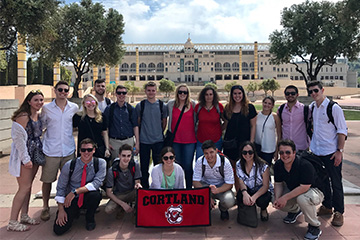
08/29/2017
It’s better to show rather than tell.
The belief inspiring SUNY Cortland’s study abroad efforts in international sport management is that the best lessons are learned by seeing or experiencing something in person rather than hearing about it secondhand.
Case in point: 18 Cortland students and three faculty members kicked off their summers with a trip to Spain and Portugal to investigate international sport culture, specifically the complexities of European soccer and multi-sport clubs. They toured Olympic training venues. They heard from front-office executives of professional teams. They even witnessed the passion that FC Barcelona fans invest in futsal, a sport similar to indoor soccer.
“For some students, this is their first time leaving the country,” said Associate Professor Tara Mahoney, who coordinated the study abroad program with Assistant Professor Justin Lovich, Assistant Professor Erin Morris and the College’s International Programs Office. “It’s rewarding to be able to open their eyes to a different culture and a new world of sport.”
The group’s travels took them to three cities — Barcelona, Madrid and Lisbon — over two weeks. Students earned six elective credits for the course, Cross-Cultural Perspectives Abroad, which involved several pre-departure class sessions as well as a month-long online learning component once students arrived home.
Before the trip, Marko Nahorniak ’17 was the only person in his family who had never traveled to Europe. The Long Hill, N.J., native transferred to SUNY Cortland because of the College’s strong reputation in sport management. He also needed additional elective coursework to complete his degree.
He saw the experience as an opportunity he couldn’t pass up.
“It was too good to be true,” said Nahorniak, who went on to work in the sponsorship department at Major League Baseball Advance Media in New York City after returning to the U.S. “I didn’t want to leave, especially after those first five days in Barcelona. Everything about it was perfect.”
Nahorniak admitted that he wasn’t a die-hard fan of soccer or other popular European sports prior to traveling abroad. Witnessing the pride and passion up close changed his perspective.
“People were going nuts for an indoor soccer game,” he said, recalling the futsal match featuring FC Barcelona. “It was crazy. And I mean that in the best way possible.”
Even more than attending live sporting events, taking in a different culture and touring historic sites, the course emphasized the value of learning from industry experts in person. Near Madrid, for instance, students gained an insider’s look at the complex inner workings of Getafe CF, a Spanish professional multi-sport club.
Mahoney explained that the operations of a European sport club can be far different from a traditional professional sports franchise in the U.S.
In La Liga, Spain’s top professional soccer league, a system of relegation and promotion allows the lowest placed teams in the top division to be replaced with the highest placed squads from the next tier. Imagine a Major League Baseball franchise being demoted to the minors after finishing with the league’s worst record, replaced by the best team in the minors.
The switch can have drastic effects on a team’s budget and operations.
When the College’s group was overseas, Getafe CF was in the second division’s playoffs to determine if the soccer squad would be promoted into the first division. The team’s marketing manager explained that his budget for the following year could be up to $60 million or less than $10 million, depending on the outcome of the playoffs.
“How do you budget or plan when there’s a difference of more than $50 million?” Mahoney said. “Lessons like that can be eye-opening for students, especially hearing from an actual team executive and thinking about them from a sport management perspective.”
In Lisbon, Portugal, students learned that the sports club Sporting CP employs people who work in different capacities across the globe, meaning that graduates do not need to live abroad to utilize their cross-cultural skill set. Stephanie Mayer, a junior sport management major from East Islip, N.Y., said her favorite part of the program was the introduction to the popular sports club.
“Sporting CP was massive, both in its physical size and operations,” said Mayer, whose dream job is to work on large-scale events such as the Olympics or Paralympics. “Just seeing how all of it comes together — the different sports and responsibilities — that was a very hands-on, personally rewarding experience for me.”
She also noted the fast friendships she made with her classmates, mentioning that they have continued their group text messaging chats and now look forward to taking classes together in the future.
“To be able to see familiar faces from a really great course makes a difference, even now after the trip is over,” she said. “I’m still going to have class with Dr. Morris and Dr. Mahoney, so it’s nice to know that I’ll be able to lean on them for guidance in the future.”
Mahoney agreed the entire program offered countless memories forged by an energetic group of students and faculty members. She specifically recalled a small exchange that occurred during a group lunch in Barcelona. Nahorniak asked the group’s tour guide how long it might take to become fluent in Spanish if he moved overseas.
“Honestly, I wasn’t even joking,” Nahorniak said. “I really want to try and master Spanish and work for a professional team or organization eventually. Traveling overseas opened my eyes to all of the opportunities that exist, especially in the industry.”
Creating those meaningful moments for students is the most satisfying reward of the College’s international sport management work, Mahoney said.
“You realize that the world is such a big place and students want to see it,” Mahoney said. “Sport always has been international, but now more than ever it’s a global landscape.”